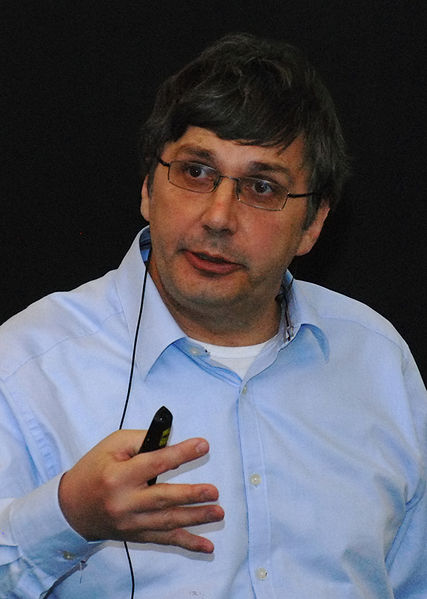

Photo from Prolineserver
Professor Andre Konstantinovich Geim earned the Nobel Prize at a very young age. I am inspired by him and am especially proud of his achievement because Geim -- like myself -- comes from the University of Manchester. When I did my Ph.D. there, my supervisor who holds an OBE was supportive of the fact that I shared all my code and never used proprietary software other than MATLAB (in order to interact and inter-operable with colleagues). It worked extremely well for me.
Geim has made some spectacular invention and he, unlike some in his field, chose to turn his back on patents. To quote a new Andre Geim interview with Nature: [via]
We considered patenting; we prepared a patent and it was nearly filed. Then I had an interaction with a big, multinational electronics company. I approached a guy at a conference and said, "We've got this patent coming up, would you be interested in sponsoring it over the years?" It's quite expensive to keep a patent alive for 20 years. The guy told me, "We are looking at graphene, and it might have a future in the long term. If after ten years we find it's really as good as it promises, we will put a hundred patent lawyers on it to write a hundred patents a day, and you will spend the rest of your life, and the gross domestic product of your little island, suing us." That's a direct quote.
I considered this arrogant comment, and I realized how useful it was. There was no point in patenting graphene at that stage. You need to be specific: you need to have a specific application and an industrial partner. Unfortunately, in many countries, including this one, people think that applying for a patent is an achievement. In my case it would have been a waste of taxpayers' money.
IBM Patents Dividing The Number 60 By Your Car's Speed
theodp writes ""A billboard," IBM explains to the USPTO in its newly granted patent for Determining Billboard Refresh Rate Based on Traffic Flow, "is a large outdoor advertisement." Guess you have to pad your writing a bit when a cornerstone of your 'invention' is dividing the number 60 by the speed of a car (in mph). To be fair, Big Blue explains things this way in the patent: "A system for determining the refresh rate per minute of the dynamic billboard based on the traffic flow information, wherein the refresh rate is equal to 60 mph/V, wherein V is equal to an average velocity in miles per hour of vehicles passing the dynamic billboard. If the average velocity is 60 mph, the new refresh rate of the dynamic billboard is one refresh per minute (i.e., each advertisement is displayed for one minute), while if the average velocity is 10 mph, the new refresh rate of the dynamic billboard is six refreshes per minute (i.e., each advertisement is displayed for ten seconds)." Which begs a question: Will you see an infinite number of ads if traffic comes to a full stop?"
These are challenging times for Eli Lilly, the company he leads. It is losing patent protection in the next seven years on drugs that accounted for 74 percent of its sales in 2009, a decline considered to be the worst patent cliff facing major companies in the industry.
Because the patents on the drugs that make up most of its revenue are all set to expire soon, and their pipeline of newly patented drugs is pretty far behind.